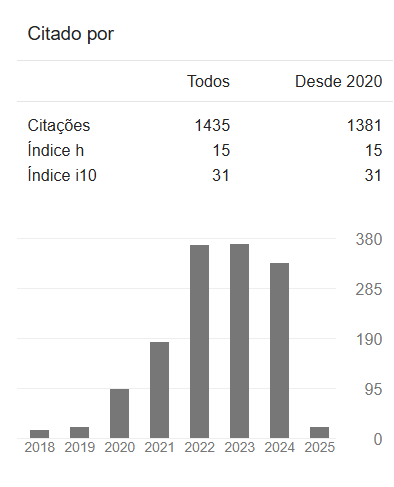TELL ME HOW YOU TEACH, I'LL TELL YOU WHO YOU ARE: PODCASTS AND SPANISH LANGUAGE IN REMOTE TEACHING
DOI:
10.23926/RPD.2022.v7.n2.e22049.id1447Keywords:
Narratives and learning experiences, Emergency teaching, Foreign Language, PodcastsAbstract
This text narrativizes experiences worked between March of two thousand and twenty and June of two thousand and twenty-one, at the Federal Institute of Education, Science and Technology of Mato Grosso. Given the impossibility of face-to-face pedagogical experience, the question emerged: How to approach the teaching of the Spanish Language with young people and adolescents during the Emergency Remote Learning, from a dialogical and meaningful perspective? Narrative Research (CLADINNIN; CONNELLY, 2011) was chosen as the method to investigate the classroom practice. The answers presented by the research participants allow us to affirm that the developed approach was based on dialog and succeeded in reaching/touching the students, since it constitutes an experience. It is possible to affirm that they gave meaning to the production of Podcasts while they were learning Spanish as a second language.
Downloads
Metrics
References
BAKHTIN, Michail. Estética da criação verbal. 2ª. ed. Trad. do francês de Maria Ermantina Galvão G. Pereira. São Paulo: Martins Fontes, em formato eletrônico, 1997.
BAKTHIN, Mikhail Mikhailovitch. Estética da criação verbal. Martins Fontes, 2011.
CALVINO, Ítalo. Por que ler os clássicos. Editora Companhia das Letras, 2007.
CLANDININ, Jean.; CONNELLY, Michel. Pesquisa Narrativa: experiências e história na pesquisa qualitativa. Tradução: Grupo de Pesquisa Narrativa e Educação de Professores ILEEL/UFU. Uberlândia: EDUFU, 2011.
DAY, Christopher. Formar Docentes: Cómo, cuándo y en qué condiciones aprende el profesorado. Narcea, Madrid: 2005.
FONTOURA, Helena Amaral de. Meu nome é professor/a: sobre aprender a docência e identidades. Revista de Educação Pública, [S. l.], v. 28, n. 68, p. 297-310, 2019. DOI: https://doi.org/10.29286/rep.v28i68.8391
FREIRE, Paulo. Educação e mudança. Editora Paz e terra, 2014.
FREIRE, Paulo. Pedagogia da esperança. 13ª. ed. Rio de Janeiro: Paz e Terra, 2006.
GADAMER, Hans-Georg. Verdade e método II: complementos e índices. Tradução de Ênio Paulo Giachini. Petrópolis, Rio de Janeiro: Vozes, 2002.
LARROSA BONDÍA, Jorge. Notas sobre a experiência e o saber de experiência. 2002. DOI: https://doi.org/10.1590/S1413-24782002000100003
MACHADO, Antonio. Caminante, no hay camino. Quimantú, 1973.
MATURANA, R. Humberto. A Ontologia da Realidade. Organizadores: Cristina Magro; Miriam Graciano; Nelson Vaz. Belo Horizonte: UFMG, 1997.
MARCUSCHI, Luiz Antônio et al. Gêneros textuais: definição e funcionalidade. Gêneros textuais e ensino, v. 2, p. 19-36, 2002.
MÉLICH, JOAN-CARLES. Del extraño al cómplice: la educación en la vida cotidiana. Barcelona: Anthropos, 1997.
Downloads
Published
How to Cite
Issue
Section
License
Copyright (c) 2023 A Revista Prática Docente tem o direito de primeira publicação

This work is licensed under a Creative Commons Attribution-NonCommercial 4.0 International License.
Authors who publish in this journal agree to the following terms:
- Authors retain the copyright and grant the journal the right of first publication, with the paper simultaneously licensed under the Licença Creative Commons Attribution allows the sharing of the work with acknowledgment of authorship and initial publication in this journal.
- Authors are authorized to take additional contracts separately, for non-exclusive distribution of the version of the work published in this journal (e.g. publish in institutional repository or as a book chapter), with acknowledgment of authorship and initial publication in this journal.











